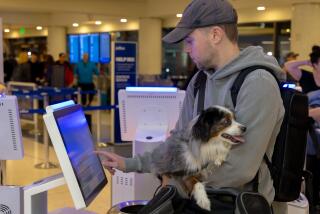The forecast for ‘05: another stormy year
- Share via
When we look at 2004, we find events and developments of greater-than-normal significance to travelers, including disasters, trends and economic changes. It’s helpful in this, the first month of 2005, to review them and modify vacation plans accordingly.
* Disasters: The horrific Indian Ocean tsunami and an unusual succession of hurricanes -- one after another hitting Florida and scattered islands of the Caribbean -- were major events in 2004 and will have a baleful effect on travel to affected nations this year. It is too early to gauge the effect in Asia, but it isn’t hard to predict that travel to the Caribbean will fall off this year during hurricane season -- from August to October. Courageous vacationers will be able to negotiate bargain prices during the period.
* The fall of the dollar: The decline of the U.S. dollar against the euro, the British pound, the Japanese yen and the currencies of Canada, Australia, New Zealand and South Africa is a top travel headline from last year. In the future, the cost-conscious will consider limiting their international travels to places where the dollar remains strong: China, Mexico, South and Central America and the Caribbean. China, in particular, is a remarkable bargain.
* A surge in cruises: The cruise industry is booming. More than 10 million people booked cruises last year. Most major lines have now forbidden their travel agents and cruise brokers from publishing their discounted prices in advertising, although they can respond to phone inquiries about discounts. Consequently, if you’re looking for a $499 one-week cruise, you may want to call well-known cruise discounters and ask whether they have any bargains.
* The cut-rate carriers: The airline upstarts continued to gain in market share and profits. Does anyone still pay full price? One result has been either new or renewed bankruptcy filings or continued bankruptcy proceedings for United, US Airways, Hawaiian Airlines, ATA and Aloha, and tenuous times for Delta.
* Expedia, Travelocity and Orbitz take hits: Various hotel chains and airlines have announced they will no longer permit the big booking engines to discount their prices, and more Internet users are going directly to the suppliers themselves -- the Internet sites of individual airlines and hotels. Internet “aggregators” -- www.kayak.com, www.sidestep.com and www.mobissimo.com, among them -- list impartial comparisons of many airlines and hotels and are soaring in use.
* The rise of Rio and Buenos Aires: The tourist capitals of Brazil and Argentina, respectively, had record-breaking tourism in 2004 and should remain popular in 2005. Their currencies are still weak against the U.S. dollar. Cost-conscious vacationers will favor these easily accessible, world-class cities.
* Sandals admits gay couples: After years of excluding them, the Caribbean resort chain Sandals now permits same-sex couples to vacation at its sites.
* Discovery of the condo/apartment: Vacationers have become more interested in such accommodations for U.S. and European vacations. (The site www.vrbo.com -- “vacation rentals by owner” -- has been particularly popular.) Scheduling at least a week’s stay in a London or Paris apartment is an effective way to enjoy low-priced lodgings and cut costs by preparing your own meals.
* The near death of Amtrak: Near the end of 2004, Congress passed an appropriations bill allocating $1.2 billion to operate Amtrak in 2005 -- $500 million less than the railroad says it needs to survive. Amtrak will operate a reduced schedule by lightly maintained trains over rickety tracks, with no real improvements or new equipment.
More to Read
Sign up for The Wild
We’ll help you find the best places to hike, bike and run, as well as the perfect silent spots for meditation and yoga.
You may occasionally receive promotional content from the Los Angeles Times.






